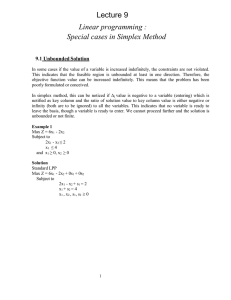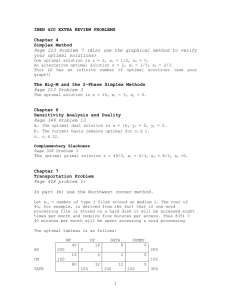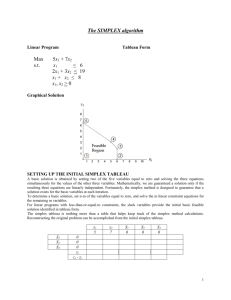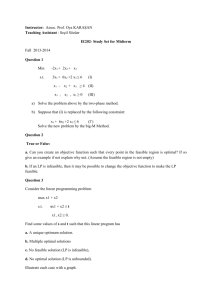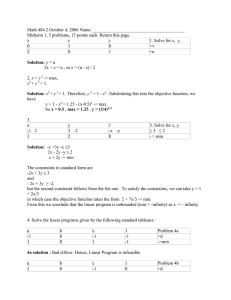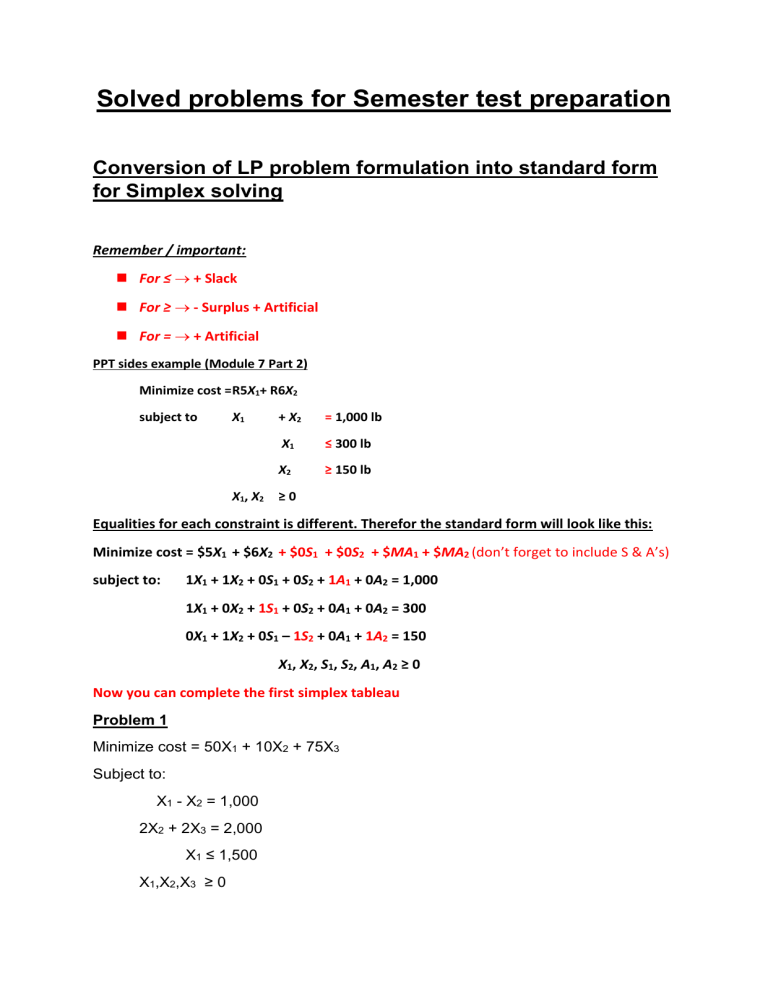
Solved problems for Semester test preparation Conversion of LP problem formulation into standard form for Simplex solving Remember / important: For ≤ + Slack For ≥ - Surplus + Artificial For = + Artificial PPT sides example (Module 7 Part 2) Minimize cost = R5X1+ R6X2 subject to X1 X1, X2 + X2 = 1,000 lb X1 ≤ 300 lb X2 ≥ 150 lb ≥0 Equalities for each constraint is different. Therefor the standard form will look like this: Minimize cost = $5X1 + $6X2 + $0S1 + $0S2 + $MA1 + $MA2 (don’t forget to include S & A’s) subject to: 1X1 + 1X2 + 0S1 + 0S2 + 1A1 + 0A2 = 1,000 1X1 + 0X2 + 1S1 + 0S2 + 0A1 + 0A2 = 300 0X1 + 1X2 + 0S1 – 1S2 + 0A1 + 1A2 = 150 X1, X2, S1, S2, A1, A2 ≥ 0 Now you can complete the first simplex tableau Problem 1 Minimize cost = 50X1 + 10X2 + 75X3 Subject to: X1 - X2 = 1,000 2X2 + 2X3 = 2,000 X1 ≤ 1,500 X1,X2,X3 ≥ 0 (a) Formulate the constraints and objective functions to standard form to use in the simplex method. Solution Problem 1 a) Minimum cost = 50X1 + 10X2 + 75X3 + 0S1 + MA1 + MA2 Subject to: 1X1 – 1X2 + 0X3 + 0S1 + 1A1 + 0A2 = 1,000 0X1 + 2X2 + 2X3 + 0S1 + 0A1 + 1A2 = 2,000 1X1 + 0X2 + 0X3 + 1S1 + 0A1 + 0A2 = 1,500 Problem 2 Maximize earnings = R0.80 X1 + R0.40 X2 + R1.20 X3 - R0.10 X4 Subject to: X1 + 2 X2 + X3 + 5 X4 150 X2 - 4 X3 + 8 X4 = 70 6 X1 + 7 X2 + 2 X3 - X4 120 X1, X2, X3, X4 0 Convert the LP problem into standard form for simplex solution Solution Problem 2 Maximize earnings: 0.8X1 + 0.4X2 + 1.2X3 – 0.1X4 + 0S1 + 0S2 – MA1 – MA2 Subject to: X1 + 2X2 + X3 + 5X4 + S1 = 150 X2 – 4X3 + 8X4 + A1 = 70 6X1 + 7X2 + 2X3 – X4 – S2 + A2 = 120 Minimization: Let: X1 = number of mattresses X2 = number of box springs Minimize cost = 20X1 + 24X2 subject to: X1 + X2 30 X1 + 2X3 40 X1, X2 0 Initial tableau: Cj M M Solution Mix A1 A2 Zj Cj – Z j $20 X1 1 1 2M –2M + 20 $24 X2 1 2 3M –3M + 24 $0 S1 –1 0 –M M $0 S2 0 –1 –M M M A1 1 0 M 0 M A2 0 1 M 0 Quantity 30 40 70M Second tableau: Cj M Solution Mix A1 $20 X1 1 X2 $24 Zj Cj – Z j 1 1 $24 X2 0 $0 S1 –1 $0 S2 1 2 1 0 2 24 M + 12 2 1 M + 12 2 0 –M M M A1 1 1 2 1 2 M – 12 2 1 M + 12 2 M A2 12 0 0 0 Quantity 10 1 20 2 1 2 M + 12 3 2 10M + 480 M – 12 Final tableau: Cj $20 $24 Solution Mix X1 X2 Zj Cj – Z j X1 = 20, X2 = 10, Min Cost = R640 $20 X1 1 0 20 0 $24 X2 0 1 24 0 $0 S1 –2 1 –16 16 $0 S2 1 –1 –4 4 M A1 2 –1 16 M – 16 M A2 –1 1 4 M–4 Quantity 20 10 R640 Maximization: Problem 1 A new furniture shop wants to optimize their profit in producing exclusive beds and chairs. Each bed yields a profit of R10.00 and each chair yields a profit of R8.00. For a production period of one week, 80 Labor hours are available for the abolstery department and 50 hours are available for the final assembly department. Each bed requires 4 hours in the abolstery department and 1 hour in the final assembly department. Each chair requires 2 hours in the abolstery department and 2 hours in the final assembly department. Formulate the production mix of beds and chairs for the furniture shop as a LP problem and then solve it using the Simplex algorithm to determine how many beds and chairs should be produced each week to optimize their profits. Let : Beds = X1 Chairs = X2 1) Formulate the above problem into a LP solution. 2) Formulate / transform the above constraints and objective functions into the standard simplex format 3) Calculate the optimal solution by using the Simplex method, using the transformed LP constraints and objective Function in question 2. Solution – Problem 1 1) Maximize profit : R10X1 + R8X2 Subject to : 4X1 + 2 X2 80 X1 + 2X2 50 (Abolstery department) (Final assembly department) X1, X2 0 2) Maximize Profit = R10X1 + R8X2 + 0S1 +0S2 Subject to: 4X1 + 2X2 + 1S1 +0S2 = 80 X1 + 2X2 + 0S1 +1S1 = 50 X1, X2 ,S1 ,S2 0 Initial tableau: Cj 0 0 Solution Mix S1 S2 Zj Cj – Z j 10 X1 4 1 0 10 8 X2 2 2 0 8 0 S1 1 0 0 0 0 S2 0 1 0 0 Quantity 80 50 0 Second tableau: Cj 10 0 Solution Mix X1 S2 Zj Cj – Z j 10 X1 1 0 10 0 8 X2 0.5 1.5 5 3 0 S1 0.25 –0.25 2.5 –2.5 0 S2 0 1 0 0 Quantity Solution Mix X1 X2 Zj 10 X1 1 0 10 8 X2 0 1 8 0 S1 0.3333 –0.1667 2 0 S2 –0.3333 0.6667 2 Quantity Cj – Zj 0 0 –2 –2 20 30 200 Third tableau: Cj 10 8 10 20 260 Solution: X1 = 10, X2=20, Profit = R260 Problem 2 The “Smurf company” produces tables and chairs for all the smurfs in there village. Each table yields a profit of R9.00 and each chair yields a profit of R12.00. For a production period of one week, only 10 liters of white paint and 12 liters of blue paint are available. Each table requires 1 liter of white paint and 1 liter of blue paint. Each chair requires 1 liter of white paint and 2 liters of blue paint. Formulate the production mix for the “Smurf company” as a LP problem and then solve it using the Simplex algorithm to determine how many tables and chairs should be produced each week to optimize their profits. Solution Problem 2 a) Maximize profit : 9X1 + 12X2 Subject to : X1 + X2 10 X1 + 2X2 12 X1, X2 0 b) Initial tableau Cj R0 R0 Solution Mix S1 S2 Zj Cj – Z j R9 X1 1 1 0 9 R12 X2 1 2 0 12 R0 S1 1 0 0 0 R0 S2 0 1 0 0 Solution Mix S1 X2 Zj R9 X1 0.5 0.5 6 R12 X2 0 1 12 R0 S1 1 0 0 R0 S2 -0.5 0.5 6 Cj – Zj 3 0 0 –6 Solution Mix X1 X2 Zj Cj – Z j R9 X1 1 0 9 0 R12 X2 0 1 12 0 R0 S1 2 –1 6 –6 R0 S2 –1 1 3 –3 Quantity 10 12 R0 Second tableau: Cj R0 R12 Quantity 4 6 R72 Final tableau: Cj R4 R12 c) The optimal solution is : X1 (Tables)= 8, X2 (Chairs)= 2 with a profit of R96.00. Quantity 8 2 R96 DUAL The primal LP formulation is as follows: Minimize cost = 23X1 + 18X2 Subject to: 8X1 + 4X2 120 4X1 + 6X2 115 9X1 + 4X2 116 a) Formulate the dual of the primal LP problem. Solution Maximize Z = 120U1 + 115U2 + 116U3 Subject to: 8U1 + 4U2 + 9U3 23 4U1 + 6U2 + 4U3 18 U1, U2, U3 0 Please note that you also must be able to formulate the Dual back to the primal LP formulation.
